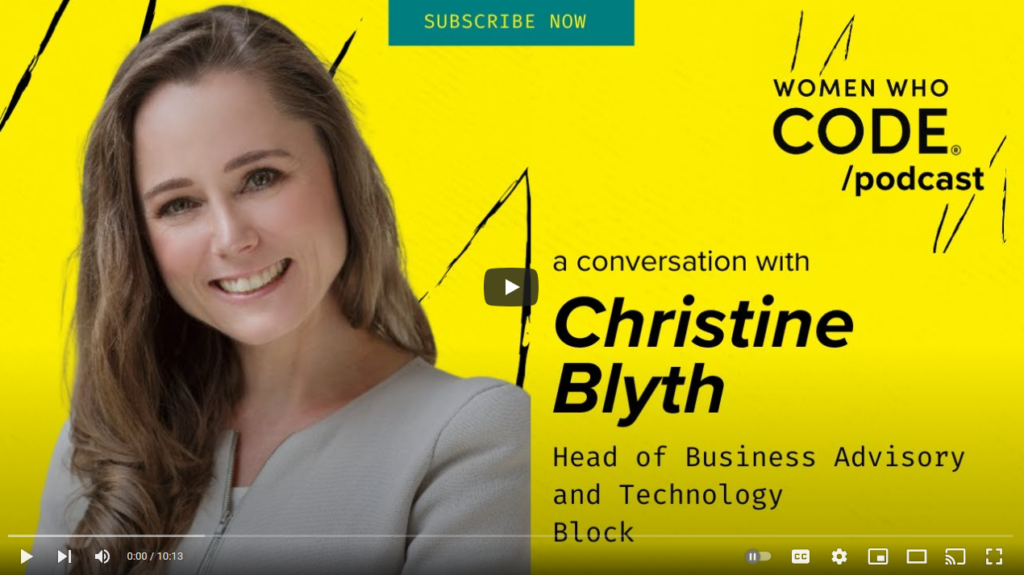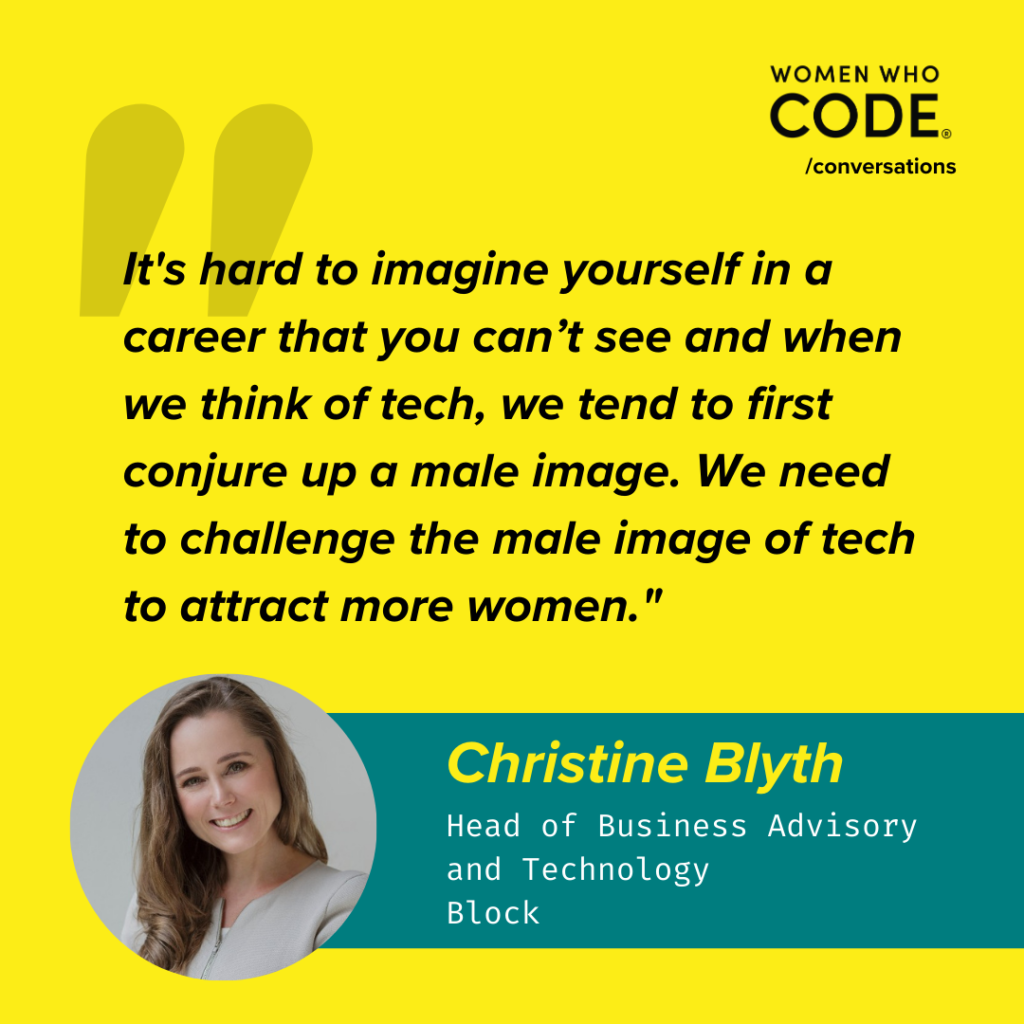Conversations #86: Christine Blyth, Head of Business Advisory and Technology for Block
Written by WWC Team

Video – iTunes – Spotify – Google
Anna Astori, Software Engineer and WWCode Boston Director sits with Christine Blyth, Head of Business Advisory and Technology at Block. They discuss Christine’s management style, her advice for women looking to get into senior leadership roles, her views on innovation, and her take on the state of diversity in technology.
Can you tell us more about your career journey?
My career journey hasn’t been conventional. My first degree was actually in psychology. I’ve always been fascinated by people, but I reached the end of that degree and realized clinical psychology wasn’t for me.
I then took an almost opposite direction. I did an accounting degree part-time while working as a tax accountant at a BTA firm. After my degree, I joined Australia’s biggest telco, where I held various roles over seven to eight years. I loved my time at Telstra but wanted more of a challenge.
Since then, I’ve held transformation roles in companies of varying sizes, largely within the tech industry. One of my roles was CFO of a professional services company, leading a large-scale transformation for Bridge Telecom in London.
In 1998, I was approached by Luke Bortoli, the CFO of Afterpay. He led Afterpay’s operational excellence team, which largely focused on scaling the back office globally. I finally joined Block as part of the Afterpay acquisition last year and was asked to lead business technology, enterprise engineering, and my operational excellence team.
That’s amazing and unconventional. What does your job entail day-to-day?
The business advisory part of my role focuses on strategic transformation across several different teams inside Block, including accounting, finance, tax, treasury, and procurement. The team is largely focused on management consulting. We’ve got some transformation specialists, product managers, technologists, and business analysts.
The technology part of my team manages the back-of-house technologies, data and product engineering, and our BI platforms. Leading such a diverse team for a company that moves quickly, no day is the same. My role is about enabling my team and always looking forward to ensuring our company can scale.
As someone who manages multiple teams, what advice do you have for women technologists considering senior management roles?
First and foremost, don’t doubt yourself. Women tend to hold back and can be more self-critical than men. My team’s women technologists and engineers are extremely talented, but I see them doubt themselves and have trouble showcasing their wins. They tend to hold back.
I’ve seen this throughout my career. It’s not just at Block. Women tend to be less bold in putting themselves up for promotions, less likely than men to take risks, and only try for roles when they feel confident they can do most tasks. I’ve seen talented women hold themselves back while less experienced and talented men take those opportunities. We hear about imposter syndrome, and it’s real, and I find it disproportionately affects women over men.
The second is to be your authentic self. The unique parts of who you are are part of your success. Being authentic builds trust because people know what to expect from you. I’ve worked with many female leaders who feel they can’t be themselves and leaders who have adopted more masculine traits, which hasn’t served them long term.
Third, find a great mentor. They’re fantastic for all executives, but especially as a woman in tech, it’s even more important to have somebody you can bounce ideas off of. It’s hard to imagine yourself in a career that you can’t see, and when we think of tech, we tend to conjure up a male image. It gets much harder as we progress into leadership. It can be quite lonely as there are very few women. We need to challenge the male image of tech and attract women.
In the work you do, your teams must be diverse and inclusive. How do you integrate diversity, equity, and inclusion into your teams?
Having a diverse workforce is critical to any company’s success. Research shows that diverse teams solve problems better and are more innovative. That’s because of the multiple perspectives that come from developing a team with varying backgrounds, cultures, and experiences.
My experience is that diversity doesn’t come naturally, especially in tech. We must be deliberate and keep that at the forefront of our decisions. For me, it means keeping in mind the natural biases that women tend to have. Diversity also plays a big role in recruiting. I’m so deliberate with recruitment, and I’m constantly challenging my hiring managers to ensure that we’re hiring people from diverse backgrounds and, of course, leaning towards hiring women. I also get involved in women’s forums, both internal and external, to Block, and I coach and mentor emerging female leaders as well.
How can women technologists use their expertise and translate it into innovative strategies for career growth?
As we progress through our careers, we move from being a deep subject matter expert into leadership. The focus has to change to be a more strategic focus. It’s a fundamental shift that I’ve watched many, both men and women, struggle with. But I think women tend to find the transition harder for our already discussed reasons. Men are more open to taking risks. Women tend to want everything in place before committing, and they tend to be more self-critical. Also, as we elevate in our careers and move into leadership, we must get comfortable directing others and setting a vision. I’ve seen women struggle with this. They tend to be less comfortable being assertive and authentic, but if you’re progressing through your career, it’s because you’ve earned it. Just keep that in mind.
How can women navigate change management at every level of their careers?
I speak to my team a lot about this. The ability to deal with ambiguity and change can be a key differentiator in your career. We see it in the corporate landscape. The companies that move fastest and adapt readily are the most successful. It’s the same for a professional individual. The most successful people I know adapt to change readily. They take measured risks, and they’re resilient.
I deal with change by being naturally curious and always seeking to understand why. I’m open to new perspectives. I try to avoid making assumptions and instead just ask many questions and listen. I focus on the opportunities that change brings rather than allowing myself to dwell on any of the negatives or challenges I see. And if I’m not feeling positive about a change, I test my perspective.
I’ve got some great colleagues that I trust, and if I’m feeling not so great, I have a conversation with them, and generally, they’ll open up my perspective or highlight where I might be a bit narrow in my thinking. I also try not to focus on what’s not immediately in my control. I can’t worry about things that aren’t in my control. It’s just not a good use of emotional energy.
What are you passionate about outside of work?
Outside of work, I am a mom to a 15-year-old child named Cooper, who is the center of my world. I try to spend as much time as possible with him away from the laptop. Cooper is high-functioning autism, so I’m passionate about neurodiversity, like gender diversity. I get involved in a lot of various organizations to try and promote better awareness and understanding of non-neurotypical people.
I also play the piano; it’s a great meditation, and I love anything outdoors. I love mountain bike riding, hiking, and running. I also love traveling, and I’ve been really lucky in my career to have global roles where I can travel the world. As hard as it is with such a big role, I try to find gaps or add some days at the end of travel to do something new and visit somewhere new.
What pro-tip would you give women in tech?
Believe in yourself. I have to check in with myself on this all the time. You have a seat at the table. Take it. Don’t be afraid to speak up and share your knowledge and opinion. Be prepared to take risks. Don’t put the fear of failure first because failure is part of growing.
Also, help other women be willing to promote rewards and highlight the work of other women. That will be so much more important when you get into a leadership position and influence who is promoted. We want the best people in a job, but keep in mind people’s biases and look for opportunities to test those biases.
***************
Video: https://youtu.be/cZR_5PQu8UE
Guest: Christine Blyth, Head of Business Advisory and Technology for Block
Host: Anna Astori, Software Engineer, WWCode Boston Director
Producer: Kimberly Jacobs, Senior Communications Manager, WWCode
